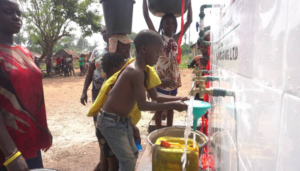Feeding a nation through farming involves a combination of sustainable agricultural practices, efficient food distribution systems, and supportive policies. Here are some key elements to consider:
- Sustainable Agriculture:
- Crop Diversity: Promote the cultivation of a variety of crops to enhance food security and resilience to pests and diseases.
- Crop Rotation: Rotate crops to improve soil fertility and reduce the risk of soil-borne diseases.
- Agroecology: Embrace agroecological practices that integrate ecological principles into agriculture, promoting biodiversity and reducing the need for synthetic inputs.
- Modern Farming Techniques:
- Precision Agriculture: Use technology like GPS-guided tractors and sensors to optimize the use of resources, reduce waste, and increase productivity.
- Greenhouse Farming: Employ controlled-environment agriculture to extend growing seasons and protect crops from adverse weather conditions.
- Water Management:
- Drip Irrigation: Adopt efficient irrigation systems to conserve water and improve crop yields.
- Water Harvesting: Implement rainwater harvesting techniques to capture and store rainwater for agricultural use during dry periods.
- Education and Training:
- Farmers’ Training Programs: Provide farmers with training on modern and sustainable farming practices to enhance their skills and knowledge.
- Access to Information: Ensure farmers have access to information about weather patterns, market conditions, and the latest agricultural technologies.
- Infrastructure Development:
- Roads and Transportation: Improve infrastructure for the transportation of agricultural products from farms to markets, reducing post-harvest losses.
- Storage Facilities: Invest in proper storage facilities to prevent food spoilage and ensure a stable food supply throughout the year.
- Government Support and Policies:
- Subsidies: Implement targeted subsidies for inputs such as seeds, fertilizers, and equipment to support farmers and make agriculture more economically viable.
- Insurance Programs: Establish crop insurance programs to protect farmers from the financial risks associated with unpredictable weather and other unforeseen events.
- Market Access:
- Market Linkages: Facilitate connections between farmers and markets to ensure fair prices for agricultural products.
- Promote Local Markets: Encourage the development of local markets to reduce the dependence on distant markets and enhance food security.
- Research and Development:
- Invest in Research: Support research and development in agriculture to develop new, resilient crop varieties and improve farming techniques.
- Extension Services: Provide farmers with access to extension services that bring the latest research findings and innovations to the field.
- Community Engagement:
- Community-Based Agriculture: Foster community involvement in agriculture, encouraging collaboration and shared resources.
- Farmers’ Cooperatives: Facilitate the formation of farmers’ cooperatives to improve bargaining power and resource sharing.
By integrating these elements, a nation can work towards achieving food security and sustainable agriculture, ensuring that its population has access to an affordable and nutritious food supply.





